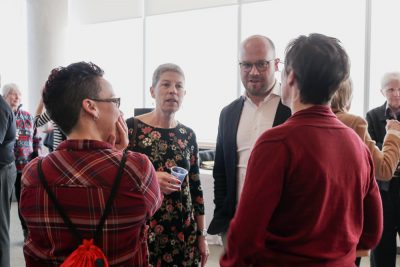By Matthew Curtis, Fourth-Year Journalism, Carleton University
As the saying goes, you are a product of your environment.
“I want a student to walk away from Carleton feeling empowered and able to engage in society. And that can be from getting a particular sort of job, to living in a particular community in a very certain kind of way, to advocating and being an engaged citizen, ” says David Hornsby, Carleton’s Associate Vice-President (Teaching and Learning).
For Hornsby, creating this environment is something he has striven to do from one side of the planet to the other – attributing this desire to insights he gained into teaching’s power and value from his first academic post at Wits University in Johannesburg, South Africa.
“In a context like South Africa, which is still dealing quite significantly with the effects of apartheid, higher education is a recourse or way to rectify that terrible history,” he says. “Education is a transformative endeavour in South Africa, where going to university is a clear pathway out of poverty.”
Hornsby says his passion for the transformative nature of teaching fuels his vision for teaching and learning – combining his background in international relations and political science to emphasize the social justice elements of teaching.
After eight years, this pairing led him from South Africa to University College in the United Kingdom, and finally to Carleton for his current role, which Hornsby says is, “in many respects, the perfect fit,” due to its emphasis on examining the construction of university teaching and learning environments.
 Arriving at Carleton, Hornsby says what struck him most was “how much effort, care and interest Carleton as an institution had in fostering a really positive, modern and critical teaching and learning environment.” He also commended faculty members’ dedication to creating this environment at both institutional and individual levels.
Arriving at Carleton, Hornsby says what struck him most was “how much effort, care and interest Carleton as an institution had in fostering a really positive, modern and critical teaching and learning environment.” He also commended faculty members’ dedication to creating this environment at both institutional and individual levels.
“For me it’s about recognizing the power of teaching and learning and that it’s a critical part of the endeavour – not an add on to the research environment or an add on to the other activities that we do,” he says.
He also reinforced the importance of constructing an educational framework to foster student success and highlighted the value of innovation, experimentation and not fearing mistakes.
“If we’re scared of making mistakes then we’re not going to be trying new things, we’re not going to be innovating. And I fear that would badly affect student success,” he says.
Ultimately, Hornsby says he wants the same for students and professors – a sense of empowerment from their time at Carleton, which students receive from their time spent in an environment that has prepared them for the changing needs of society, and which professors receive from realizing the importance of what they do in the teaching and learning space.
“It comes back to my experience in South Africa where I realized there was a clear link between someone coming from an impoverished background and getting a university degree, and fundamentally transforming their lives and being able to help make South Africa better and have a better life for themselves. And I think that still holds true here.”